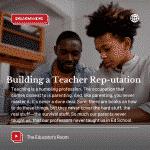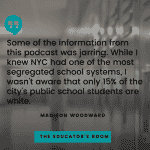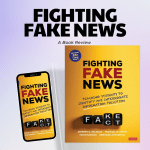Overview:
Taylor Swift's latest album may be what educators need because it shows us that we're all tortured poets.
In case you’ve been living under a rock, perhaps in the form of ungraded student work that’s slowly suffocating you, Taylor Swift came out with her eleventh studio album, All Tortured Poets, last month.
She is, of course, best known for her songs about love, relationships, and heartbreak. But they’re not just about breakups, but breakthroughs. Uncertainty and earth shaking confidence, pain and the immense beauty that can grow from it. They’re simply about life.
Listening to all thirty-one tracks of this breakup album, I can’t help but draw connections to education. Taylor is a masterful storyteller, and this album makes it clear that she’s writing her grief and mourning through her poetry.
We educators who have taught through COVID-19 are most likely in a kind of mourning, too. Swifite or not, a misguided English major turned AP lit teacher or not, we might just all be members of The Tortured Poets Department.
***
“I Can Do It With a Broken Heart”: I cry a lot but I am so productive, it’s an art
Let’s just get this infinitely TikTokable line out of the way to start with. Who among us has not cried on our way to work? Or on the way back from work. Or in the bathroom during lunch after a kid cussed us out. And on our prep, over an anxiety-inducing parent phone call.
But, dang, our Tuesday lesson plans were stunning. Louvre worthy, even if three of twenty eight kids actually engaged.
“Down Bad”: Everything comes out teenage petulance
We’ve all had those moments when we realize we’ve probably worked with teenagers too long. Perhaps when we hand out an assignment and they roll their eyes and groan, “do I have to do this?” we roll our eyes and groan back, with a little too much bite, “yeah, sorry I’m just trying to help you learn and be a better human or whatever.”
Or there’s that one student who has done nothing for six months but suddenly needs to graduate and the response that we barely bite back in a conversation with his mom is “I didn’t do it! He did, go get him in trouble!.”
Or maybe, we have that pile of grading to do but when our students ask when they’ll be updated in the gradebook, we just smile stiffly and say “oh yeah, I was gonna do it, but then… I just didn’t. I’ll do it soon though, promise.”
“Fortnight”: All my mornings are Mondays stuck in an endless February
Or March, or October, or January right after winter break, or anytime there’s a full moon or a major holiday or a high octane breakup or a lunch line that was too long or state testing.
“Guilty as Sin”: What if I roll the stone away? They’re gonna crucify me anyway.
Educators are lazy, unqualified, and members of the deep state here to indoctrinate innocent children*. The books they stick in libraries are undignified smut, the history lessons are left wing propaganda, and every guidance counselor persuades the children to change their gender as a part of the gay agenda.
“The Albatross”: Wise men once read fake news and they believed it
*See above, though I’m not sure people who shout, “My taxes pay your salaries!” could ever really be considered “wise.”
“I Can Do It With a Broken Heart”: Cause I’m a real tough kid I can handle my sh**
If we taught before Covid, during Covid, and are still here, even with a caffeine and crying induced eye twitch, we can indeed handle our sh**. We’ve broken up fights in the girls’ bathroom, helped students come down from panic attacks and vape hits, sat by their side patiently while they ask about something we taught weeks ago, been a shoulder to cry on, and begged them to do something, anything at all. We can handle our sh**.
Even if we had to fake it til we made it from period one‘s inane insistence on the pledge of allegiance to the relief granted by the long awaited final bell. If we don’t think we actually did anything right all week, all month, all year and we don’t think they learned anything, we can handle our sh**. Even if we shouldn’t have to.
“How Did It End?”: We hereby conduct this post-mortem
We remember having full class discussions about the books we actually read together; talking about the heartbreaking inhumanity of Night instead of begging them to read one paragraph of a book review. I can remember a classroom without phones and thought we will laugh at that TikTok too, we mourn all of our abilities to focus on something longer than 15 seconds. We remember thinking that our graduates were on to their next wildest dreams, not unemployed “and just vibing.”
We don’t want to fall back on “kids these days,” because we’d tell our students that kind of conclusion is just a reductionist fallacy. Was it Covid? Is it just students? Is it us? Or is it the fractures in our inequitable system finally starting to show as unavoidable chasms? The most unsatisfying of post modems is no clear answers, no closure.
***
The other day, I posted a screenshot of my most recent Google search (what to do besides teaching) in my stories, and the response was immediate. So many fellow educators flooded my DMs with versions of “saaame.” We’re not alone, and I can’t decide if that’s more comforting or frightening.
Just as I’m tentatively optimistic that Taylor can find lasting love this time (The Alchemy: I haven’t come around in so long / But I’m coming back so strong) I’m hopeful we can reclaim the joy teaching once had. But maybe we need to just mourn it for a while. Maybe it’s okay to not “give everything” or “promise to be dazzling” (Clara Bow). Maybe we all need our versions of a thirty-one-song double album to cope with what was, what could have been, and what we hope to be.






